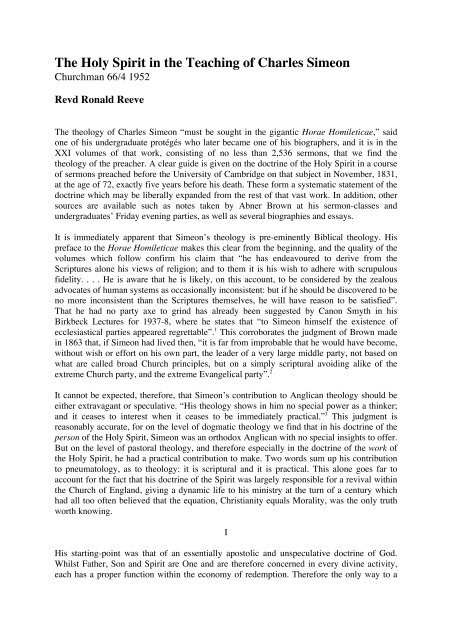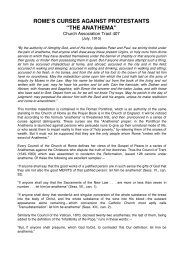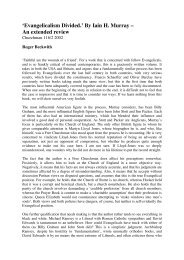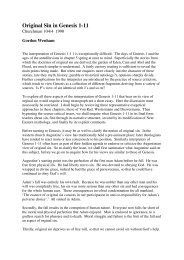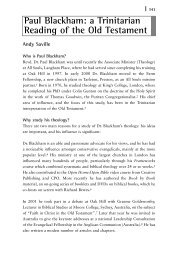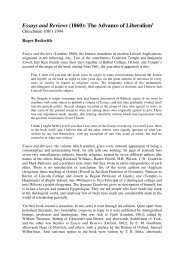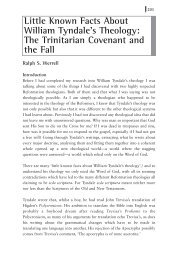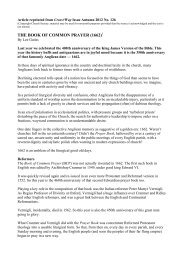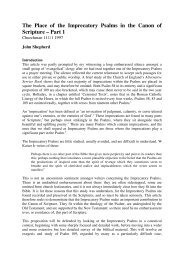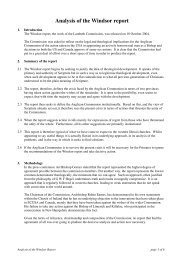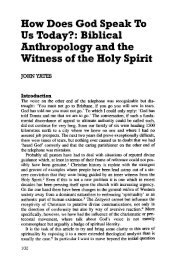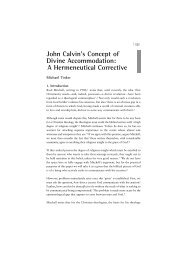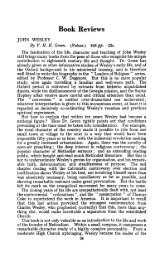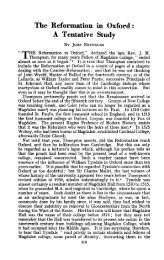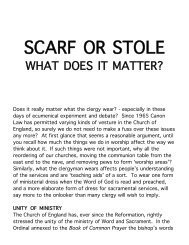The Holy Spirit in the Teaching of Charles Simeon - Church Society
The Holy Spirit in the Teaching of Charles Simeon - Church Society
The Holy Spirit in the Teaching of Charles Simeon - Church Society
You also want an ePaper? Increase the reach of your titles
YUMPU automatically turns print PDFs into web optimized ePapers that Google loves.
<strong>The</strong> <strong>Holy</strong> <strong>Spirit</strong> <strong>in</strong> <strong>the</strong> Teach<strong>in</strong>g <strong>of</strong> <strong>Charles</strong> <strong>Simeon</strong><br />
<strong>Church</strong>man 66/4 1952<br />
Revd Ronald Reeve<br />
<strong>The</strong> <strong>the</strong>ology <strong>of</strong> <strong>Charles</strong> <strong>Simeon</strong> “must be sought <strong>in</strong> <strong>the</strong> gigantic Horae Homileticae,” said<br />
one <strong>of</strong> his undergraduate protégés who later became one <strong>of</strong> his biographers, and it is <strong>in</strong> <strong>the</strong><br />
XXI volumes <strong>of</strong> that work, consist<strong>in</strong>g <strong>of</strong> no less than 2,536 sermons, that we f<strong>in</strong>d <strong>the</strong><br />
<strong>the</strong>ology <strong>of</strong> <strong>the</strong> preacher. A clear guide is given on <strong>the</strong> doctr<strong>in</strong>e <strong>of</strong> <strong>the</strong> <strong>Holy</strong> <strong>Spirit</strong> <strong>in</strong> a course<br />
<strong>of</strong> sermons preached before <strong>the</strong> University <strong>of</strong> Cambridge on that subject <strong>in</strong> November, 1831,<br />
at <strong>the</strong> age <strong>of</strong> 72, exactly five years before his death. <strong>The</strong>se form a systematic statement <strong>of</strong> <strong>the</strong><br />
doctr<strong>in</strong>e which may be liberally expanded from <strong>the</strong> rest <strong>of</strong> that vast work. In addition, o<strong>the</strong>r<br />
sources are available such as notes taken by Abner Brown at his sermon-classes and<br />
undergraduates’ Friday even<strong>in</strong>g parties, as well as several biographies and essays.<br />
It is immediately apparent that <strong>Simeon</strong>’s <strong>the</strong>ology is pre-em<strong>in</strong>ently Biblical <strong>the</strong>ology. His<br />
preface to <strong>the</strong> Horae Homileticae makes this clear from <strong>the</strong> beg<strong>in</strong>n<strong>in</strong>g, and <strong>the</strong> quality <strong>of</strong> <strong>the</strong><br />
volumes which follow confirm his claim that “he has endeavoured to derive from <strong>the</strong><br />
Scriptures alone his views <strong>of</strong> religion; and to <strong>the</strong>m it is his wish to adhere with scrupulous<br />
fidelity. . . . He is aware that he is likely, on this account, to be considered by <strong>the</strong> zealous<br />
advocates <strong>of</strong> human systems as occasionally <strong>in</strong>consistent: but if he should be discovered to be<br />
no more <strong>in</strong>consistent than <strong>the</strong> Scriptures <strong>the</strong>mselves, he will have reason to be satisfied”.<br />
That he had no party axe to gr<strong>in</strong>d has already been suggested by Canon Smyth <strong>in</strong> his<br />
Birkbeck Lectures for 1937-8, where he states that “to <strong>Simeon</strong> himself <strong>the</strong> existence <strong>of</strong><br />
ecclesiastical parties appeared regrettable”. 1 This corroborates <strong>the</strong> judgment <strong>of</strong> Brown made<br />
<strong>in</strong> 1863 that, if <strong>Simeon</strong> had lived <strong>the</strong>n, “it is far from improbable that he would have become,<br />
without wish or effort on his own part, <strong>the</strong> leader <strong>of</strong> a very large middle party, not based on<br />
what are called broad <strong>Church</strong> pr<strong>in</strong>ciples, but on a simply scriptural avoid<strong>in</strong>g alike <strong>of</strong> <strong>the</strong><br />
extreme <strong>Church</strong> party, and <strong>the</strong> extreme Evangelical party”. 2<br />
It cannot be expected, <strong>the</strong>refore, that <strong>Simeon</strong>’s contribution to Anglican <strong>the</strong>ology should be<br />
ei<strong>the</strong>r extravagant or speculative. “His <strong>the</strong>ology shows <strong>in</strong> him no special power as a th<strong>in</strong>ker;<br />
and it ceases to <strong>in</strong>terest when it ceases to be immediately practical.” 3 This judgment is<br />
reasonably accurate, for on <strong>the</strong> level <strong>of</strong> dogmatic <strong>the</strong>ology we f<strong>in</strong>d that <strong>in</strong> his doctr<strong>in</strong>e <strong>of</strong> <strong>the</strong><br />
person <strong>of</strong> <strong>the</strong> <strong>Holy</strong> <strong>Spirit</strong>, <strong>Simeon</strong> was an orthodox Anglican with no special <strong>in</strong>sights to <strong>of</strong>fer.<br />
But on <strong>the</strong> level <strong>of</strong> pastoral <strong>the</strong>ology, and <strong>the</strong>refore especially <strong>in</strong> <strong>the</strong> doctr<strong>in</strong>e <strong>of</strong> <strong>the</strong> work <strong>of</strong><br />
<strong>the</strong> <strong>Holy</strong> <strong>Spirit</strong>, he had a practical contribution to make. Two words sum up his contribution<br />
to pneumatology, as to <strong>the</strong>ology: it is scriptural and it is practical. This alone goes far to<br />
account for <strong>the</strong> fact that his doctr<strong>in</strong>e <strong>of</strong> <strong>the</strong> <strong>Spirit</strong> was largely responsible for a revival with<strong>in</strong><br />
<strong>the</strong> <strong>Church</strong> <strong>of</strong> England, giv<strong>in</strong>g a dynamic life to his m<strong>in</strong>istry at <strong>the</strong> turn <strong>of</strong> a century which<br />
had all too <strong>of</strong>ten believed that <strong>the</strong> equation, Christianity equals Morality, was <strong>the</strong> only truth<br />
worth know<strong>in</strong>g.<br />
I<br />
His start<strong>in</strong>g-po<strong>in</strong>t was that <strong>of</strong> an essentially apostolic and unspeculative doctr<strong>in</strong>e <strong>of</strong> God.<br />
Whilst Fa<strong>the</strong>r, Son and <strong>Spirit</strong> are One and are <strong>the</strong>refore concerned <strong>in</strong> every div<strong>in</strong>e activity,<br />
each has a proper function with<strong>in</strong> <strong>the</strong> economy <strong>of</strong> redemption. <strong>The</strong>refore <strong>the</strong> only way to a
full knowledge <strong>of</strong> <strong>the</strong> Tr<strong>in</strong>itarian God is to know each person <strong>in</strong> His fulness. This meant that<br />
<strong>Simeon</strong>, unlike many <strong>of</strong> his successors, gave full weight to <strong>the</strong> Fa<strong>the</strong>r and <strong>the</strong> <strong>Spirit</strong>, and<br />
would not allow “<strong>the</strong> fulness <strong>of</strong> Christ” to overshadow ei<strong>the</strong>r. <strong>The</strong> adequacy <strong>of</strong> our doctr<strong>in</strong>e<br />
<strong>of</strong> God is <strong>in</strong> exact proportion to <strong>the</strong> degree <strong>in</strong> which we have experienced <strong>the</strong> presence and<br />
power <strong>of</strong> each person <strong>of</strong> <strong>the</strong> Godhead <strong>in</strong> our own lives.<br />
“How astonish<strong>in</strong>g are our obligations to each person <strong>in</strong> <strong>the</strong> Sacred Tr<strong>in</strong>ity! <strong>The</strong> Fa<strong>the</strong>r is <strong>the</strong><br />
great source and founta<strong>in</strong> <strong>of</strong> all our bless<strong>in</strong>gs: Christ is <strong>the</strong> procurer <strong>of</strong> <strong>the</strong>m, and <strong>the</strong> medium<br />
through whom <strong>the</strong>y come: and <strong>the</strong> <strong>Holy</strong> <strong>Spirit</strong> is <strong>the</strong> agent by whom <strong>the</strong>y are conveyed to us.<br />
Let us hold fellowship with each <strong>in</strong> his dist<strong>in</strong>ct <strong>of</strong>fice and character, and acknowledge with<br />
gratitude <strong>the</strong>ir united exertions” (Sermon 2002).<br />
<strong>The</strong> phrase “let us hold fellowship with each” is <strong>the</strong> key to <strong>Simeon</strong>’s <strong>the</strong>ology, as <strong>in</strong>deed to<br />
all <strong>the</strong>ology, as Pr<strong>of</strong>essor Turner rem<strong>in</strong>ds us when he says that “<strong>The</strong> lex orandi was . . .<br />
always prior to <strong>the</strong> lex credendi”. 4<br />
<strong>The</strong> dist<strong>in</strong>ct personality <strong>of</strong> <strong>the</strong> <strong>Spirit</strong> is demonstrated very simply from scripture. “He susta<strong>in</strong>s<br />
<strong>the</strong> <strong>of</strong>fices <strong>of</strong> a person, be<strong>in</strong>g a Comforter (John xiv. 16-17), an Intercessor (Rom. viii. 26), a<br />
Teacher (Jn. xiv. 26), a Witness (Rom. viii. 16). He also performs <strong>the</strong> acts <strong>of</strong> a person;<br />
command<strong>in</strong>g (Acts xiii. 2-4), forbidd<strong>in</strong>g (Acts xvi. 6-7), judg<strong>in</strong>g (Acts xv. 28)” (Sermon<br />
1752). <strong>The</strong>re is no attempt to def<strong>in</strong>e what is meant by personality <strong>in</strong> relation to <strong>the</strong> person <strong>of</strong><br />
God beyond <strong>the</strong> mere statement that “<strong>in</strong> reference to this subject we use <strong>the</strong> term persons<br />
because <strong>the</strong>re is no o<strong>the</strong>r so suitable” (Sermon 2465). <strong>Simeon</strong> is content to assert, as Peter’s<br />
open<strong>in</strong>g words to Ananias, “Why hath Satan filled thy heart to lie to <strong>the</strong> <strong>Holy</strong> Ghost?” (Acts<br />
v. 3) make clear, that to <strong>the</strong> Apostle <strong>the</strong> <strong>Holy</strong> <strong>Spirit</strong> is a person and not an abstract quality; so<br />
his clos<strong>in</strong>g words, “Thou hast not lied unto men, but unto God” (Acts v. 4), make it pla<strong>in</strong> that<br />
He is God. Beyond this, <strong>the</strong> div<strong>in</strong>ity <strong>of</strong> <strong>the</strong> <strong>Spirit</strong> is seen most clearly <strong>in</strong> <strong>the</strong> realm <strong>of</strong><br />
soteriology where <strong>the</strong> equality <strong>of</strong> <strong>the</strong> Fa<strong>the</strong>r, Son and <strong>Spirit</strong> claim our faith. “For as, if Christ<br />
be not God we can have no hope from His death, so, if <strong>the</strong> <strong>Holy</strong> <strong>Spirit</strong> be not God, we can<br />
have no hope from His agency” (Sermon 1982).<br />
<strong>The</strong> statement <strong>of</strong> <strong>the</strong> Nicaenum that <strong>the</strong> <strong>Holy</strong> Ghost “proceedeth from <strong>the</strong> Fa<strong>the</strong>r and <strong>the</strong><br />
Son”, is equally simply <strong>in</strong>terpreted.<br />
“To exercise mercy was God’s desire: and that he might exercise it <strong>in</strong> consistency with His own<br />
immaculate hol<strong>in</strong>ess, He determ<strong>in</strong>ed to give His only-begotten Son, that through Him, and <strong>in</strong><br />
His Sacred Person, His hatred <strong>of</strong> s<strong>in</strong> might be made manifest; and to give His <strong>Holy</strong> <strong>Spirit</strong> also<br />
that, through His effectual agency, His love <strong>of</strong> hol<strong>in</strong>ess might be displayed” (Sermon 1221).<br />
In this sense <strong>the</strong>re is a true subord<strong>in</strong>ation <strong>of</strong> both <strong>the</strong> Son and <strong>the</strong> <strong>Spirit</strong> to <strong>the</strong> Fa<strong>the</strong>r, not<br />
with<strong>in</strong> <strong>the</strong> economy <strong>of</strong> personality, but with<strong>in</strong> <strong>the</strong> economy <strong>of</strong> redemption. <strong>The</strong> Son proceeds<br />
from <strong>the</strong> Fa<strong>the</strong>r, and <strong>the</strong> <strong>Spirit</strong> from <strong>the</strong> Fa<strong>the</strong>r by <strong>the</strong> Son. Hence, whilst <strong>the</strong> Fa<strong>the</strong>r is <strong>the</strong><br />
source <strong>of</strong> <strong>the</strong> <strong>Spirit</strong>, <strong>the</strong> way <strong>in</strong> which He has made Him available to man <strong>in</strong> His fulness is<br />
through <strong>the</strong> Son, <strong>the</strong> pla<strong>in</strong> mean<strong>in</strong>g <strong>of</strong> <strong>the</strong> New Testament be<strong>in</strong>g that <strong>the</strong> Glorified Christ<br />
received <strong>the</strong> gift <strong>of</strong> <strong>the</strong> <strong>Spirit</strong> <strong>in</strong> His plenitude from <strong>the</strong> Fa<strong>the</strong>r <strong>in</strong> order to give Him to His<br />
<strong>Church</strong>. This be<strong>in</strong>g so, <strong>the</strong>n <strong>the</strong> <strong>Spirit</strong> proceeds <strong>in</strong> a special way from Christ, albeit<br />
“accord<strong>in</strong>g to <strong>the</strong> Fa<strong>the</strong>r’s will” (Sermon 1246).<br />
<strong>The</strong> head<strong>in</strong>gs <strong>of</strong> <strong>Simeon</strong>’s sermon on “<strong>The</strong> Personality and Office <strong>of</strong> <strong>the</strong> <strong>Holy</strong> <strong>Spirit</strong>”<br />
(Sermon 1701) give a useful summary. “He is a dist<strong>in</strong>ct Person. . . . Yet, though dist<strong>in</strong>ct from<br />
<strong>the</strong> Fa<strong>the</strong>r he is, <strong>in</strong> his essential properties, equal to him. . . . Never<strong>the</strong>less, <strong>in</strong> some respects
he is subord<strong>in</strong>ate both to <strong>the</strong> Fa<strong>the</strong>r and <strong>the</strong> Son.” <strong>The</strong> first respect <strong>in</strong> which he is subord<strong>in</strong>ate<br />
is “<strong>in</strong> <strong>the</strong> order <strong>of</strong> subsistence, as <strong>the</strong> Fa<strong>the</strong>r is not <strong>of</strong> <strong>the</strong> Son, but <strong>the</strong> Son <strong>of</strong> <strong>the</strong> Fa<strong>the</strong>r, so<br />
nei<strong>the</strong>r <strong>the</strong> Fa<strong>the</strong>r nor <strong>the</strong> Son proceeds from <strong>the</strong> <strong>Spirit</strong>, but <strong>the</strong> <strong>Spirit</strong> from <strong>the</strong>m, <strong>in</strong>asmuch as<br />
he proceeds from <strong>the</strong> Fa<strong>the</strong>r and is sent by <strong>the</strong> Son”. <strong>The</strong> second aspect <strong>of</strong> His subord<strong>in</strong>ation<br />
is “<strong>in</strong> <strong>the</strong> order <strong>of</strong> operation”, that is, <strong>in</strong> His <strong>of</strong>fice <strong>in</strong> <strong>the</strong> economy <strong>of</strong> redemption. Canon<br />
Fison has diagnosed <strong>the</strong> <strong>Spirit</strong>’s subord<strong>in</strong>ation as result<strong>in</strong>g from His “<strong>in</strong>curable tendency to<br />
self-effacement”, 5 and <strong>Simeon</strong> notes <strong>the</strong> four ages <strong>of</strong> this trait <strong>in</strong> His div<strong>in</strong>e character.<br />
“Before <strong>the</strong> time <strong>of</strong> Christ’s <strong>in</strong>carnation . . . he <strong>in</strong>spired <strong>the</strong> prophets to foretell <strong>the</strong> th<strong>in</strong>gs <strong>in</strong><br />
relation to His suffer<strong>in</strong>gs and glory. Dur<strong>in</strong>g <strong>the</strong> days <strong>of</strong> our Lord’s m<strong>in</strong>istry on earth . . . it was<br />
by <strong>the</strong> <strong>Spirit</strong> that Christ cast out devils, and performed his o<strong>the</strong>r miracles. . . . After He had<br />
ascended <strong>in</strong>to heaven it was <strong>the</strong>n that <strong>the</strong> <strong>Spirit</strong> began fully to execute <strong>the</strong> <strong>of</strong>fice assigned to<br />
him, and to ‘glorify Christ’ before an ungodly and unbeliev<strong>in</strong>g world. To this very hour does<br />
<strong>the</strong> <strong>Spirit</strong> bear <strong>the</strong> same part ‘conv<strong>in</strong>c<strong>in</strong>g <strong>the</strong> world <strong>of</strong> s<strong>in</strong>, <strong>of</strong> righteousness and <strong>of</strong> judgement’<br />
<strong>in</strong> order to magnify Christ and to enlarge His k<strong>in</strong>gdom” (ibid).<br />
<strong>The</strong>re is, <strong>the</strong>n, an orthodox subord<strong>in</strong>ation <strong>of</strong> <strong>the</strong> <strong>Spirit</strong> to <strong>the</strong> Fa<strong>the</strong>r and <strong>the</strong> Son. “But <strong>the</strong><br />
<strong>in</strong>feriority is not personal, but <strong>of</strong>ficial; not as <strong>the</strong> Sacred Three subsist <strong>in</strong> <strong>the</strong>mselves, but as<br />
<strong>the</strong>y susta<strong>in</strong> and execute <strong>the</strong>ir respective <strong>of</strong>fices <strong>in</strong> <strong>the</strong> economy <strong>of</strong> redemption” (Sermon<br />
1863). Such is <strong>Simeon</strong>’s statement <strong>of</strong> <strong>the</strong> person <strong>of</strong> <strong>the</strong> <strong>Holy</strong> <strong>Spirit</strong>. It is deficient <strong>in</strong> that it has<br />
no deep <strong>in</strong>sight <strong>in</strong>to <strong>the</strong> unity <strong>in</strong> Tr<strong>in</strong>ity beyond its mere statement as a fact. It has, however,<br />
what <strong>the</strong> generality <strong>of</strong> Christians lack: that is, a fully scriptural appreciation <strong>of</strong> <strong>the</strong> <strong>Spirit</strong>’s<br />
person deduced from His work <strong>in</strong> redemption. <strong>The</strong> result is a sound orthodoxy which will<br />
never allow Him to be relegated to “a poor third” and consequently thought <strong>of</strong>, however<br />
unwitt<strong>in</strong>gly, as less than personal.<br />
II<br />
Whilst we must depend most fully on <strong>the</strong> observed work <strong>of</strong> <strong>the</strong> <strong>Spirit</strong> <strong>in</strong> redemption and post-<br />
Calvary experience for our knowledge <strong>of</strong> Him, <strong>the</strong> fact rema<strong>in</strong>s that <strong>the</strong> relationship between<br />
man and <strong>the</strong> <strong>Spirit</strong> began, not at Pentecost, but at <strong>the</strong> moment <strong>of</strong> creation. <strong>Simeon</strong> rem<strong>in</strong>ds us,<br />
as we come to consider <strong>the</strong> work <strong>of</strong> <strong>the</strong> <strong>Spirit</strong>, that “None but he who moved upon <strong>the</strong> chaos,<br />
and formed it <strong>in</strong>to order and beauty can new create <strong>the</strong> soul” (Sermon 2192). St. John began<br />
his Gospel with <strong>the</strong> formula <strong>of</strong> Genesis i. 1 because <strong>the</strong> re-creation <strong>of</strong> man made possible<br />
through Christ and made effective through <strong>the</strong> <strong>Holy</strong> <strong>Spirit</strong> is <strong>the</strong> new creation directly parallel<br />
with <strong>the</strong> orig<strong>in</strong>al creation. Fr. Lionel Thornton has spoken <strong>of</strong> “<strong>the</strong> essential repetition <strong>in</strong>herent<br />
<strong>in</strong> spiritual truth”, and this must be <strong>the</strong> basis for all legitimate typology which seeks, not to<br />
distort <strong>the</strong> old to verify <strong>the</strong> new, but to see <strong>the</strong> unchang<strong>in</strong>g pattern <strong>of</strong> <strong>the</strong> div<strong>in</strong>e activity<br />
runn<strong>in</strong>g through both. <strong>The</strong> Λóγος [Word] and <strong>the</strong> Πνευµα του Θεου [<strong>Spirit</strong> <strong>of</strong> God] are seen<br />
at work <strong>in</strong> both <strong>of</strong> <strong>the</strong> covenants <strong>of</strong> God. In Gen. i <strong>the</strong> ‘ruach Jahweh’ [God’s <strong>Spirit</strong>/breath] is<br />
jo<strong>in</strong>ed with <strong>the</strong> ‘dabar Jahweh’ [God’s Word] as <strong>the</strong> creative ενεργεια [work<strong>in</strong>g]. <strong>The</strong> New<br />
covenant is new, because <strong>in</strong> it a new creation comes <strong>in</strong>to be<strong>in</strong>g by a second concerted act <strong>of</strong><br />
<strong>the</strong> Word and <strong>the</strong> <strong>Spirit</strong>. This is stated by <strong>Simeon</strong> with a deceptive naïveté when he says,<br />
“Meth<strong>in</strong>ks <strong>the</strong>re is some analogy between <strong>the</strong> first creation <strong>of</strong> all th<strong>in</strong>gs and this new creation<br />
which takes place <strong>in</strong> <strong>the</strong> soul <strong>of</strong> man” (Sermon 1117). It is, however, <strong>the</strong> rul<strong>in</strong>g thought <strong>in</strong> all<br />
that he wrote and believed concern<strong>in</strong>g “<strong>the</strong> Lord and Giver <strong>of</strong> Life”.<br />
Dur<strong>in</strong>g <strong>the</strong> <strong>in</strong>terim period between <strong>the</strong> Fall and <strong>the</strong> Atonement <strong>the</strong> work <strong>of</strong> <strong>the</strong> <strong>Spirit</strong> was to<br />
glorify Christ as <strong>the</strong> promised Saviour. “It was by <strong>the</strong> <strong>Holy</strong> Ghost that Christ spake <strong>in</strong> <strong>the</strong><br />
m<strong>in</strong>istry <strong>of</strong> Noah to <strong>the</strong> antedeluvian world (1 Pet. iii. 18-20), and <strong>in</strong>structed all his people <strong>in</strong>
<strong>the</strong> wilderness (Neh. ix. 20). It was by <strong>the</strong> <strong>Holy</strong> Ghost that he moved <strong>the</strong> prophets <strong>in</strong><br />
succeed<strong>in</strong>g ages to declare future events (2 Peter i. 21), and especially to predict his<br />
suffer<strong>in</strong>gs and <strong>the</strong> glory that should follow” (Sermon 1863). From <strong>the</strong> Fall at least (which is<br />
<strong>the</strong> only period we know) <strong>the</strong> <strong>Holy</strong> <strong>Spirit</strong> has revealed <strong>the</strong> m<strong>in</strong>d, will and purpose <strong>of</strong> God to<br />
those who have sought to be reunited with Him, <strong>in</strong>spir<strong>in</strong>g many <strong>of</strong> <strong>the</strong>m to record His<br />
revelation <strong>in</strong> <strong>the</strong> written word. Record and revelation, both before and after Pentecost, are <strong>the</strong><br />
work <strong>of</strong> <strong>the</strong> same <strong>Spirit</strong> who <strong>in</strong>terprets <strong>the</strong>m to <strong>the</strong> seeker <strong>in</strong> every age. <strong>The</strong>refore <strong>the</strong> primary<br />
medium <strong>of</strong> His <strong>in</strong>spiration and revelation is <strong>the</strong> <strong>Holy</strong> Bible because <strong>the</strong> gift <strong>of</strong> prophecy <strong>in</strong><br />
men is an awareness <strong>of</strong> His activity <strong>in</strong> redemption <strong>in</strong> <strong>the</strong>ir own generation, verifiable not so<br />
much by its fulfilment as by its dist<strong>in</strong>ctive pattern.<br />
We should <strong>the</strong>refore expect <strong>the</strong> New Covenant to beg<strong>in</strong> with <strong>the</strong> work <strong>of</strong> <strong>the</strong> <strong>Spirit</strong> <strong>in</strong> creation<br />
and we f<strong>in</strong>d it <strong>in</strong> <strong>the</strong> Virg<strong>in</strong> Birth, which is not seen as an isolated miracle but as <strong>the</strong> only<br />
possible beg<strong>in</strong>n<strong>in</strong>g to a new order which must be susta<strong>in</strong>ed by <strong>the</strong> Creator-<strong>Spirit</strong> at every<br />
po<strong>in</strong>t. This creative activity <strong>of</strong> <strong>the</strong> <strong>Spirit</strong> is <strong>the</strong> primary fact <strong>of</strong> <strong>the</strong> New Creation, seen by<br />
<strong>Simeon</strong> not merely <strong>in</strong> <strong>the</strong> genesis <strong>of</strong> our Lord but <strong>in</strong> <strong>the</strong> whole <strong>of</strong> His m<strong>in</strong>istry both on earth<br />
and <strong>in</strong> heaven. He “qualified <strong>the</strong> man Jesus for his work, and upheld him <strong>in</strong> it, and wrought<br />
miracles by him <strong>in</strong> confirmation <strong>of</strong> his mission and raised him up from <strong>the</strong> dead, and bore<br />
witness to him <strong>in</strong> a visible manner on <strong>the</strong> day <strong>of</strong> Pentecost” (Sermon 165). At His baptism<br />
our Lord “was consecrated to his prophetic <strong>of</strong>fice by a visible unction <strong>of</strong> <strong>the</strong> <strong>Holy</strong> <strong>Spirit</strong>”<br />
(Sermon 1004). Immediately, He was impelled by <strong>the</strong> <strong>Spirit</strong> to meet <strong>the</strong> devil on <strong>the</strong> battleground<br />
<strong>of</strong> His own heart” and by that same <strong>Spirit</strong> was enabled to vanquish that mighty foe”<br />
(Sermon 1863). Hav<strong>in</strong>g <strong>the</strong>refore defeated <strong>the</strong> evil one <strong>in</strong> Himself by <strong>the</strong> power <strong>of</strong> <strong>the</strong> <strong>Spirit</strong><br />
<strong>of</strong> hol<strong>in</strong>ess He was able to defeat Him <strong>in</strong> o<strong>the</strong>rs. “It was by <strong>the</strong> <strong>Spirit</strong> that Jesus cast out<br />
devils and performed his o<strong>the</strong>r miracles” (Sermon 1701), as He Himself said (Mt. xii. 28).<br />
“By <strong>the</strong> same div<strong>in</strong>e Agent also was he assisted <strong>in</strong> <strong>of</strong>fer<strong>in</strong>g himself a sacrifice upon <strong>the</strong> cross;<br />
for ‘through <strong>the</strong> Eternal <strong>Spirit</strong>, he <strong>of</strong>fered himself without spot to God’” (Sermon 119: Heb.<br />
ix. 14). By Him also was He afterwards resurrected, for “<strong>the</strong> <strong>Spirit</strong> raised him from <strong>the</strong> dead<br />
and <strong>the</strong>reby declared him to be <strong>the</strong> Son <strong>of</strong> God with power” (Sermon 2230; Rom. i. 4). <strong>The</strong><br />
Ascension falls naturally <strong>in</strong>to place as <strong>the</strong> culm<strong>in</strong>at<strong>in</strong>g triumph <strong>of</strong> a life whose purpose was<br />
union with God. But it was a triumph <strong>in</strong> <strong>the</strong> Roman sense <strong>in</strong> which Christ entered <strong>in</strong>to glory.<br />
“As conquerors <strong>in</strong> <strong>the</strong>ir triumphs were wont to scatter gifts and largesses among <strong>the</strong> people,<br />
so he received from his Heavenly Fa<strong>the</strong>r <strong>the</strong> <strong>Holy</strong> <strong>Spirit</strong>, and poured him forth upon <strong>the</strong><br />
<strong>Church</strong> <strong>in</strong> all his gifts and graces” (Sermon 2108).<br />
This pattern <strong>of</strong> Christ’s <strong>in</strong>carnation is <strong>the</strong> pattern for His <strong>Church</strong> as <strong>the</strong> extension <strong>of</strong> that<br />
<strong>in</strong>carnation. As <strong>the</strong> <strong>Holy</strong> <strong>Spirit</strong> was <strong>the</strong> motive power <strong>in</strong> Christ, and as Christ is <strong>the</strong> αρχηγóς<br />
[Pr<strong>in</strong>ce] <strong>of</strong> <strong>the</strong> redeemed community, so <strong>the</strong> <strong>Holy</strong> <strong>Spirit</strong> is <strong>in</strong>tended to be <strong>the</strong> dynamic <strong>in</strong> us,<br />
and <strong>Simeon</strong> can say that, “as Christ is ALL <strong>in</strong> procur<strong>in</strong>g salvation for us, so <strong>the</strong> <strong>Holy</strong> <strong>Spirit</strong> is<br />
ALL <strong>in</strong> impart<strong>in</strong>g salvation to us” (Sermon 1329). <strong>The</strong> Incarnation was, <strong>in</strong> essence, “<strong>the</strong> <strong>Holy</strong><br />
<strong>Spirit</strong> co-operat<strong>in</strong>g with <strong>the</strong> Lord Jesus Christ <strong>in</strong> effect<strong>in</strong>g <strong>the</strong> redemption <strong>of</strong> a ru<strong>in</strong>ed world”<br />
(Sermon 165). <strong>The</strong> revelation <strong>of</strong> that Incarnation, culm<strong>in</strong>at<strong>in</strong>g <strong>in</strong> Atonement as reconciliation<br />
and Pentecost as re-creation, is that <strong>the</strong>re is One God <strong>in</strong> Three Persons and that He is Love.<br />
This is <strong>the</strong> basic statement <strong>of</strong> <strong>the</strong> New Testament, where<strong>in</strong> “<strong>the</strong> Fa<strong>the</strong>r, <strong>the</strong> Son and <strong>the</strong> <strong>Holy</strong><br />
<strong>Spirit</strong> are represented as concurr<strong>in</strong>g <strong>in</strong> <strong>the</strong> great work <strong>of</strong> Redemption: <strong>the</strong> Fa<strong>the</strong>r send<strong>in</strong>g his<br />
Son <strong>in</strong>to <strong>the</strong> world; <strong>the</strong> Son lay<strong>in</strong>g down his life for us; and <strong>the</strong> <strong>Holy</strong> <strong>Spirit</strong> proceed<strong>in</strong>g from<br />
<strong>the</strong> Fa<strong>the</strong>r and <strong>the</strong> Son, to apply that redemption to our souls” (Sermon 487). It is here, <strong>in</strong> <strong>the</strong><br />
work <strong>of</strong> <strong>the</strong> <strong>Spirit</strong> <strong>in</strong> <strong>the</strong> application <strong>of</strong> Christ’s Atonement to <strong>the</strong> <strong>in</strong>dividual, that <strong>Simeon</strong>’s<br />
ma<strong>in</strong> emphasis appears.
<strong>The</strong> prevenience <strong>of</strong> <strong>the</strong> <strong>Holy</strong> <strong>Spirit</strong> is summed up <strong>in</strong> <strong>the</strong> epigram, “As Christ died for all, so<br />
does <strong>the</strong> <strong>Holy</strong> <strong>Spirit</strong> strive with all” (Sermon 2459). Wherever a man beg<strong>in</strong>s to look to Christ<br />
for salvation <strong>the</strong> <strong>in</strong>itiative has been supplied by Him whose purpose is to glorify Christ. St.<br />
Paul cautioned <strong>the</strong> Ephesians not to “grieve” <strong>the</strong> <strong>Spirit</strong> (iv. 30) and <strong>the</strong> <strong>The</strong>ssalonians not to<br />
“quench” Him (v. 19) because <strong>the</strong>re can be nei<strong>the</strong>r salvation <strong>in</strong> <strong>the</strong> first place, nor<br />
sanctification <strong>in</strong> <strong>the</strong> second, where He is ignored. Especially is this true when He speaks<br />
through His primary medium <strong>of</strong> revelation, <strong>the</strong> <strong>Holy</strong> Bible. “<strong>The</strong> <strong>Church</strong> has received light<br />
from God <strong>in</strong> all ages and a mass <strong>of</strong> knowledge has thus been acquired for <strong>the</strong> benefit <strong>of</strong> <strong>the</strong><br />
<strong>Church</strong>. But <strong>the</strong> <strong>Holy</strong> <strong>Spirit</strong> while he has thus been teach<strong>in</strong>g, has never explicitly po<strong>in</strong>ted out<br />
whe<strong>the</strong>r He has taught this man or that man; whe<strong>the</strong>r he has taught this truth or that truth; but<br />
has given us only one standard <strong>of</strong> all—that is, Scripture. Hence we may hear all <strong>the</strong><br />
<strong>in</strong>terpretations which have ever been given, but we know not that one <strong>of</strong> <strong>the</strong>m is more true<br />
than ano<strong>the</strong>r, save by compar<strong>in</strong>g it with <strong>the</strong> mass <strong>of</strong> Scripture.” 6 It is, <strong>in</strong> fact, most <strong>of</strong>ten by<br />
this Word, and always <strong>in</strong> accordance with it, “that God acts. Miracles gave credibility to <strong>the</strong><br />
testimony which Christ and his Apostles bore: but it was <strong>the</strong> testimony itself, as applied by<br />
<strong>the</strong> <strong>Holy</strong> <strong>Spirit</strong> to <strong>the</strong> soul, that wrought effectually upon <strong>the</strong> hearts <strong>of</strong> men. And <strong>in</strong> all ages it<br />
is <strong>the</strong> same word, ei<strong>the</strong>r read or preached, that is effectual to convert <strong>the</strong>m to God” (Sermon<br />
2214).<br />
III<br />
<strong>The</strong> purpose <strong>of</strong> <strong>the</strong> <strong>Spirit</strong>’s striv<strong>in</strong>g with men through <strong>the</strong> Word is to br<strong>in</strong>g about <strong>the</strong>ir recreation<br />
or re-birth <strong>in</strong> Christ, which must <strong>the</strong>n be followed by a lifetime <strong>of</strong> sanctification. Our<br />
Lord said that, “Except a man be born from above (R.V. marg.) he cannot see <strong>the</strong> K<strong>in</strong>gdom<br />
<strong>of</strong> God” (Jn. iii. 3), and amplified this statement by def<strong>in</strong><strong>in</strong>g <strong>the</strong> new creation as be<strong>in</strong>g “born<br />
<strong>of</strong> water and <strong>the</strong> <strong>Spirit</strong>” (Jn. iii. 5). S<strong>in</strong>ce this was <strong>the</strong> raison d’être <strong>of</strong> <strong>the</strong> Incarnation, <strong>Simeon</strong><br />
rem<strong>in</strong>ds us that “we must seek <strong>the</strong> renew<strong>in</strong>g <strong>in</strong>fluences <strong>of</strong> <strong>the</strong> <strong>Spirit</strong> because our nature is<br />
altoge<strong>the</strong>r corrupt. . . . When <strong>the</strong>refore we hear <strong>of</strong> <strong>the</strong> <strong>in</strong>dispensable necessity <strong>of</strong> be<strong>in</strong>g born<br />
aga<strong>in</strong>, and <strong>of</strong> <strong>the</strong> impossibility <strong>of</strong> be<strong>in</strong>g saved except by faith <strong>in</strong> Christ, let us remember that<br />
<strong>the</strong>se are not <strong>the</strong> dogmas <strong>of</strong> a party, but doctr<strong>in</strong>es consequent upon our fallen state, and<br />
<strong>the</strong>refore <strong>of</strong> universal and <strong>in</strong>f<strong>in</strong>ite importance” (Sermon 1861).<br />
Man really needs salvation, and s<strong>in</strong>ce “a th<strong>in</strong>g must exist before we can know that it exists . .<br />
. <strong>the</strong>refore <strong>the</strong> knowledge <strong>of</strong> our acceptance with God cannot precede that acceptance”<br />
(Sermon 1662). <strong>The</strong>refore <strong>the</strong> work <strong>of</strong> <strong>the</strong> <strong>Spirit</strong> <strong>in</strong> convict<strong>in</strong>g <strong>the</strong> world <strong>in</strong> respect <strong>of</strong> s<strong>in</strong>,<br />
righteousness and judgement (Jn. xvi. 8-11) refers not only to <strong>the</strong> κóσµος [cosmos] as <strong>the</strong><br />
Johann<strong>in</strong>e anti<strong>the</strong>sis <strong>of</strong> <strong>the</strong> spiritual world, but also to <strong>the</strong> <strong>in</strong>dividuals who are part <strong>of</strong> that<br />
world-order until <strong>the</strong>y are united with Christ. Until <strong>the</strong> <strong>Spirit</strong> beg<strong>in</strong>s His work <strong>of</strong> conviction a<br />
man cannot see that he is alienated from God. <strong>The</strong>re is an external testimony <strong>of</strong> <strong>the</strong> <strong>Spirit</strong> to<br />
<strong>the</strong> κóσµος [cosmos] which rema<strong>in</strong>s <strong>the</strong> same <strong>in</strong> all ages. <strong>The</strong>re is, with<strong>in</strong> that external<br />
testimony, an <strong>in</strong>ternal testimony to those who are part <strong>of</strong> that world <strong>in</strong> every generation. “To<br />
<strong>the</strong>m <strong>the</strong> <strong>Spirit</strong> shews <strong>the</strong> number, <strong>the</strong> greatness, <strong>the</strong> malignity <strong>of</strong> <strong>the</strong>ir s<strong>in</strong>s; and particularly,<br />
<strong>the</strong> guilt, <strong>the</strong> danger <strong>of</strong> that unbelief <strong>in</strong> which <strong>the</strong>y have ignorantly la<strong>in</strong>” (Sermon 1702). By<br />
this means <strong>the</strong> need <strong>of</strong> man is consciously aroused <strong>in</strong> him by a <strong>Spirit</strong>-given brokenness, an<br />
<strong>of</strong>fice which can only be described as παρακλητος [paraclete] (“one called to assist<br />
ano<strong>the</strong>r’s need”).
In <strong>the</strong> second place, <strong>the</strong> <strong>Spirit</strong>’s work is to conv<strong>in</strong>ce <strong>the</strong> world <strong>of</strong> <strong>the</strong> righteousness <strong>of</strong> Christ.<br />
His death bore <strong>the</strong> signs <strong>of</strong> crim<strong>in</strong>al execution, but when <strong>the</strong> <strong>Spirit</strong> came He v<strong>in</strong>dicated <strong>the</strong><br />
stigma <strong>of</strong> <strong>the</strong> Cross and showed it to be a case <strong>of</strong> murder. In <strong>the</strong> <strong>in</strong>dividual, <strong>the</strong> correspond<strong>in</strong>g<br />
Work is to <strong>in</strong>dicate <strong>the</strong> Cross as <strong>the</strong> place where man’s implication <strong>in</strong> <strong>the</strong> rebellion <strong>of</strong> <strong>the</strong><br />
κóσµος [cosmos] aga<strong>in</strong>st God is proved and expiated at <strong>the</strong> same time “For this also a div<strong>in</strong>e<br />
agency is wanted, as much as for <strong>the</strong> souls before God. We may <strong>in</strong>deed acknowledge that <strong>the</strong><br />
Lord Jesus Christ is <strong>the</strong> appo<strong>in</strong>ted Saviour. We may even contend for it as an article <strong>of</strong> our<br />
creed, and write learned dissertations upon it; but all this is widely different from that k<strong>in</strong>d <strong>of</strong><br />
view which <strong>the</strong> <strong>Spirit</strong> <strong>of</strong> Christ gives to <strong>the</strong> believ<strong>in</strong>g soul” (Sermon 1865).<br />
In <strong>the</strong> third place this leads to <strong>the</strong> conviction that judgement has been pronounced with<br />
e<strong>in</strong>maligkeit [unique] certa<strong>in</strong>ty. Pentecost proved to <strong>the</strong> world that God had acted <strong>in</strong> history<br />
and liberated His people. “He shewed to <strong>the</strong> first Christians that Satan was a vanquished foe:<br />
by <strong>the</strong> descent <strong>of</strong> <strong>the</strong> <strong>Spirit</strong> it was manifest that Christ had triumphed” (Sermon 1702). In <strong>the</strong><br />
<strong>in</strong>dividual this κρισις demands unconditional surrender to <strong>the</strong> Victor, and when this is made<br />
<strong>the</strong> <strong>Holy</strong> <strong>Spirit</strong> cooperates with Christ <strong>in</strong> an act <strong>of</strong> new creation, achiev<strong>in</strong>g <strong>the</strong>reby <strong>the</strong> logical<br />
end <strong>of</strong> salvation <strong>in</strong> man.<br />
“To state precisely how this work shall be wrought <strong>in</strong> us is beyond our power” (Sermon<br />
1117). “It is called <strong>in</strong> Scripture ‘a new creation’; and a man can no more create himself anew<br />
than he could create himself at first” (Sermon 1864). But whatever may be <strong>the</strong> mechanics <strong>of</strong><br />
this transformation it is clear that what God has provided <strong>in</strong> <strong>the</strong> economy <strong>of</strong> redemption is<br />
atonement, re-creation and sanctification—<strong>in</strong> that order. “God provides for our acceptance<br />
with him, through <strong>the</strong> blood <strong>of</strong> his dear Son; for our renovation after his own div<strong>in</strong>e image,<br />
through <strong>the</strong> <strong>in</strong>fluences <strong>of</strong> his Good <strong>Spirit</strong>; for our perseverance <strong>in</strong> <strong>the</strong> ways <strong>of</strong> hol<strong>in</strong>ess even<br />
to <strong>the</strong> end” (Sermon 307). It is <strong>the</strong>refore only at this po<strong>in</strong>t that <strong>Simeon</strong> passes with equal<br />
prolificacy and conviction to <strong>the</strong> work <strong>of</strong> <strong>the</strong> <strong>Holy</strong> <strong>Spirit</strong> <strong>in</strong> sanctification, through his<br />
treatment <strong>of</strong> which runs <strong>the</strong> <strong>the</strong>me that <strong>the</strong> fruits <strong>of</strong> <strong>the</strong> <strong>Spirit</strong> are <strong>the</strong> signs and assurances <strong>of</strong><br />
His primary work <strong>in</strong> salvation as <strong>the</strong> Agent <strong>of</strong> Christ, and <strong>the</strong>refore cannot precede it.<br />
In such a statement <strong>of</strong> <strong>the</strong> doctr<strong>in</strong>e <strong>the</strong>re is much that is conspicuous by its absence and<br />
notably any real attempt to def<strong>in</strong>e <strong>the</strong> κοινωνια [communion/fellowship] <strong>of</strong> <strong>the</strong> <strong>Spirit</strong> and<br />
reach a balanced statement <strong>of</strong> <strong>the</strong> relation it must have to <strong>the</strong> <strong>Spirit</strong>-filled <strong>in</strong>dividual. But it is<br />
also true that it serves to redress an equal omission <strong>in</strong> ano<strong>the</strong>r direction. <strong>The</strong>ology has <strong>of</strong>ten<br />
asked, “What will <strong>the</strong> <strong>Holy</strong> <strong>Spirit</strong> work <strong>in</strong> us when we are Christ’s?” But perhaps <strong>the</strong>re is a<br />
prior question. “What will <strong>the</strong> <strong>Holy</strong> <strong>Spirit</strong> work <strong>in</strong> us <strong>in</strong> order that we may be Christ’s?”<br />
REV. RONALD REEVE<br />
Endnotes:<br />
1) <strong>Simeon</strong> and <strong>Church</strong> Order, p. xi.<br />
2) Abner Brown, Recollections <strong>of</strong> <strong>the</strong> Conversation Parties <strong>of</strong> <strong>the</strong> Rev. Chas. <strong>Simeon</strong>, M.A.<br />
(1863), pp. 64-5.<br />
3) Simpk<strong>in</strong>son, Typical English <strong>Church</strong>men (1902), p. 284.<br />
4) <strong>The</strong> Patristic Doctr<strong>in</strong>e <strong>of</strong> Redemption (1952), p. 13.
5) <strong>The</strong> Bless<strong>in</strong>g <strong>of</strong> <strong>the</strong> <strong>Holy</strong> <strong>Spirit</strong>, (1950), p. 11.<br />
6) Abner Brown, ibid., p. 297.


